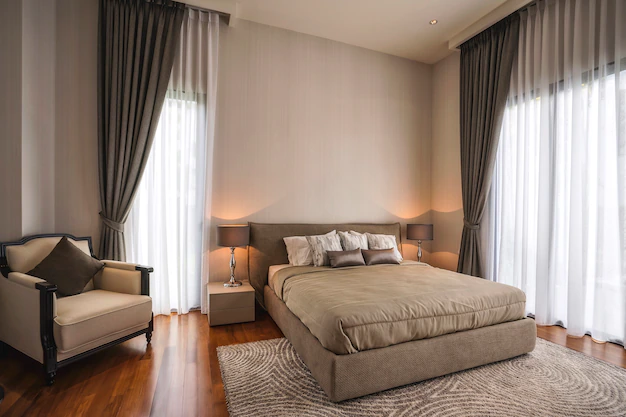Sleep Environment

Set yourself up for success by creating an environment that promotes restful sleep.
- Ensure that you have a comfortable bed. Your bed is the most important piece of furniture in your home. You spend over 1/3 of your day in your bed. Invest in a good one.
- Invest in the right pillow. The wrong pillow may worsen headaches, neck pain, shoulder and arm numbness, discomfort, and wheezing.
- Back sleepers need thinner pillows, to prevent the head from being pushed too far forward
- Side sleepers need a firmer pillow to fill in the distance between the ear and the mattress
- Stomach sleepers benefit from a very thin, almost flat pillow
- Consider a weighted blanket. The research on the benefits of weighted blankets remains inconclusive but many people have found that sleeping under the added weight helps to reduce anxiety, and in some cases, reduce insomnia. Sleeping under firm but gentle pressure can help you fall asleep faster, sleep longer, and wake feeling more rested.
- Weighted blankets provide deep touch pressure stimulation which is believed to promote the release of serotonin, a chemical which regulates sleep.
- Weighted blankets can have a calming effect in children and adults with sensory processing disorder, and can help reduce anxiety.
- Weighted blankets contain plastic pellets, ball bearings, or other objects. They range in weight from 5 pounds to 30 pounds. A good rule of thumb is to select a weighted blanket that is about 10% of your body weight.
- Maintain a bedroom temperature of 60 – 68°F. In the winter months, don’t crank up the heat too high, as a cooler room supports good sleep. Stay warm by using blankets and a duvet cover along with warm night clothes. In the summer months use lighter-weight bedding, wear light-weight night clothes, and cool down your room before bedtime by opening the windows. When necessary use fans or air conditioning to get the temperature right.
- Ensure that your room is dark. Use window coverings that block out light, or wear a mask so that natural light does not awaken you too early.
- Ensure that your room is quiet. Ask other family members to be quiet during the hours you are sleeping. Wear earplugs if necessary.
- Keep distractions out of the bedroom. All distractions should be relocated to other rooms, especially electronic devices. Those include TVs, computers, and tablets. Put your phone on the “Do Not Disturb” setting.
